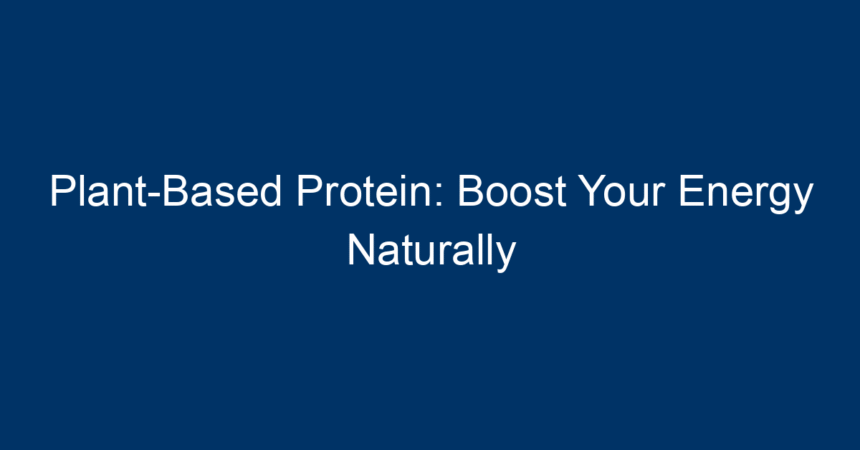In today’s health-conscious society, the quest for sustainable energy sources is more important than ever. Many people are turning to plant-based protein as a natural way to fuel their bodies while also reaping the benefits of a diet rich in nutrients. This article dives deep into what plant-based protein is, its benefits, sources, and how to integrate it seamlessly into your diet for a natural energy boost.
Understanding Plant-Based Protein
What Is Plant-Based Protein?
Plant-based protein refers to protein derived from plants. This includes a wide variety of sources, such as legumes, nuts, seeds, grains, and vegetables. Unlike animal-based proteins, which can often be high in saturated fats, plant-based proteins are typically lower in calories and packed with vitamins and minerals.
Why Choose Plant-Based Protein?
Choosing plant-based protein is beneficial not just for personal health, but for the environment as well. Plant protein sources tend to have a lower carbon footprint than animal agriculture, making them a more sustainable option. Plus, they’re usually easier on the digestive system and can help combat health issues such as heart disease, obesity, and diabetes.
The Benefits of Plant-Based Protein
1. Improved Energy Levels
One of the most significant advantages of consuming plant-based protein is its ability to boost energy levels naturally. High-protein meals can provide sustained energy, preventing the spikes and crashes often associated with sugar-laden snacks. Foods high in complex carbohydrates, like quinoa and brown rice, combined with protein can result in a steady release of energy.
2. Rich in Essential Nutrients
Plant-based proteins come packed with vitamins, minerals, and antioxidants. For instance, legumes contain fiber, iron, and B vitamins, while nuts are rich in healthy fats and vitamin E. By incorporating these foods into your diet, you’re not just getting protein; you’re also boosting your overall nutrient intake.
3. Supports Digestive Health
Many plant-based protein sources are rich in fiber, which aids digestion and promotes a healthy gut. Fiber helps maintain regular bowel movements and can prevent constipation, making it especially beneficial for overall health. This can lead to better nutrient absorption, further enhancing your energy levels.
4. Weight Management
Plant-based diets are often lower in calories and bad fats compared to diets rich in animal products. Switching to plant-based protein can help with weight management by promoting a feeling of fullness while providing essential nutrients. Research indicates that individuals consuming more plant-based foods tend to have a lower body mass index (BMI).
5. Reduced Risk of Chronic Diseases
Numerous studies have shown that diets high in plant-based foods can lower the risk of chronic diseases such as heart disease, diabetes, and certain types of cancer. The antioxidants found in plant foods help fight inflammation and oxidative stress, which are linked to many chronic conditions.
Top Sources of Plant-Based Protein
Incorporating a variety of plant-based protein sources is vital for a well-rounded diet. Here are some excellent options:
1. Legumes
Legumes, such as lentils, chickpeas, and beans, are among the richest sources of plant protein. They can easily be added to soups, salads, and stews for an energy-boosting meal. For instance, a simple lentil salad can pack a protein punch while providing fiber and essential nutrients.
2. Nuts and Seeds
Almonds, walnuts, chia seeds, and flaxseeds not only provide protein but also deliver healthy fats essential for brain function. A handful of mixed nuts or a sprinkle of seeds on your oatmeal can enhance your energy levels throughout the day.
3. Whole Grains
Brown rice, quinoa, and barley are fantastic sources of plant-based protein that can also provide much-needed carbohydrates. These grains can be used as a base for bowls or sides to accompany main dishes.
4. Tofu and Tempeh
Tofu and tempeh, made from soybeans, are excellent sources of complete protein. They are versatile and can be grilled, stir-fried, or added to smoothies, making them an easy addition to any meal.
5. Green Vegetables
While not as high in protein as other sources, green leafy vegetables like spinach, broccoli, and kale still contribute to your daily protein needs. They are also loaded with essential vitamins and minerals, making them a healthy choice.
How to Incorporate Plant-Based Protein into Your Diet
1. Start Your Day with a Protein-Packed Breakfast
Kick off your day with a smoothie loaded with spinach, nut butter, and protein powder made from peas or brown rice. Alternatively, consider oatmeal topped with chia seeds and sliced bananas for a nutritious start.
2. Snack Smartly
Avoid unhealthy snacks and choose plant-based options instead. Hummus with carrot sticks or a handful of trail mix can provide sustained energy and curb hunger.
3. Make the Switch to Plant-Based Meals
Swap out your usual meat dishes for plant-based alternatives. Try chickpea curry, lentil burgers, or a hearty quinoa salad.
4. Experiment with Protein Powders
Plant-based protein powders can be a convenient way to boost your intake—especially post-workout. Look for options that contain a blend of various plant proteins for maximum benefit.
5. Explore International Cuisines
Many cultures emphasize plant-based diets. Exploring meals from Mediterranean, Indian, or Southeast Asian cuisines can introduce you to delicious and nutritious plant-based protein dishes.
Actionable Insights for a Balanced Diet
-
Plan Your Meals: Take time each week to plan meals that incorporate various sources of plant-based protein.
-
Mix and Match: Combine different types of plant proteins in meals to create complete protein profiles. For example, pair rice with beans for a complete amino acid profile.
-
Stay Hydrated: Water is essential, especially when consuming higher amounts of protein. It aids digestion and helps prevent constipation.
-
Listen to Your Body: Pay attention to how your body responds to different protein sources. Adjust your diet according to what feels best for you.
- Consult a Nutritionist: If you’re unsure where to start or how to balance your diet, consider seeking guidance from a registered dietitian.
Conclusion
Incorporating plant-based protein into your diet can provide a natural and effective means of boosting your energy levels while improving your overall health. Not only does it support sustainable practices, but it also offers a wealth of nutrients essential for your well-being.
By making small but significant changes to your eating habits, including a variety of plant-based protein sources in your meals, you’re investing in a healthier, more energetic you. Start today, and embrace the vibrant world of plant-based eating for a happier, healthier lifestyle!




